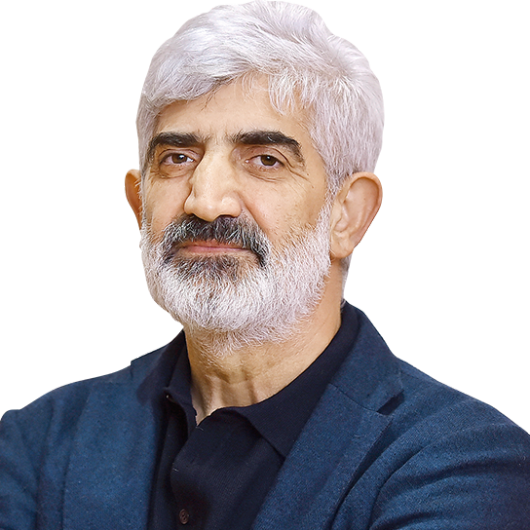
- 06.01.2025, Monday
- 21:57
Iran's regional Theory of Chaos has collapsed
20:414/01/2025, Cumartesi
Next article
İhsan Aktaş

Iran and Türkiye are two regional powers that operate on the thesis that by protecting each other, both states can continue to exist. This analysis should not be read through the lens of Türkiye-Iran relations, but rather as an examination of Iran's own regional strategy. Each country develops its foreign policy and security doctrine based on its geopolitical position, history, geography, power elements, and state capacity. Since the 1978 Islamic Revolution, Iran has adopted the strategy of "spreading
Iran and Türkiye are two regional powers that operate on the thesis that by protecting each other, both states can continue to exist. This analysis should not be read through the lens of Türkiye-Iran relations, but rather as an examination of Iran's own regional strategy.
Each country develops its foreign policy and security doctrine based on its geopolitical position, history, geography, power elements, and state capacity. Since the 1978 Islamic Revolution, Iran has adopted the strategy of "spreading the Islamic revolution" as the most prominent feature of its revolutionary politics. In the early years of the revolution, the universal Islamic message took center stage, but over time, this message merged with Persian nationalism and radical Shia sectarianism, evolving into a national ideology combined with the pride of the Persian Empire.
Over the last two decades, Iran's most evident policy has been to "leave regional countries in chaos and turmoil to keep the Iranian mainland safe." Iran has not made an effort to establish order in countries like Iraq, Syria, Lebanon, and Yemen. Iraq, having been invaded by the US, saw its existing state structure destroyed and subjected to great devastation. Many exiled leaders during Saddam's regime became active in Iraq's post-invasion politics, indicating that the US essentially handed Iraq over to Iran. However, despite 30 years of Iranian influence, Iraq has failed to establish a stable state order.
The Iraq Example and Türkiye's Role
When examining Iraq specifically, the Development Path Project, the strengthening of Türkiye-Iraq relations, and Türkiye's suppression of the PKK contribute to the hope of Iraq becoming a strong, unitary state. Despite Shia making up 60% of Iraq's population, the Iraqi people have realized that Iran's Islamic Republic is not attempting to establish order for them.
Iran has been indirectly satisfied with the PKK's presence in Iraq and with ISIS taking over Iraqi cities. The US replaced ISIS in the areas they occupied with the PKK, while Iran followed a similar policy, filling the Iraqi army with Shia militias. However, in recent times, Iraq has started to develop policies focusing on the future of its own people through rational steps.
During a visit to a former Deputy Foreign Minister in Tehran, the following words were spoken: "The US fought us for 10 years, invaded Iraq, and handed it to us. It also invaded Afghanistan, the arch-enemy of the Shia. Both countries are now governed by people who lived in exile in Iran."
Syria and Iran's Policies
When the Arab Spring began, a popular uprising broke out in Syria, one of the most closed-off regimes in the Islamic world under Hafiz al-Assad. Nusayris, Christians, Turkmen, Arabs, and other groups were all opposed to the Assad regime, with 90% of the population against it.
Initially, the US and Western countries did not support a popular revolution in Syria. Iran, however, expertly escalated the revolution into armed violence and stood behind the regime. Additionally, by exploiting Russia's efforts to access the seas, Iran invited Russia to Syria and delayed the revolution's success by a decade.
Iran has shown no inclination to establish order in Syria and has not allowed either the Geneva or Astana processes to proceed. Even if Syria were to experience forty more years of conflict, it would continue to serve Iran's chaos theory. The suffering of 90% of the population was of no concern to Iran, nor would it ever be. The more militias Iran brought in and the more generals it incorporated into the system, all of its strategies were designed to prevent Syria from becoming a state and to perpetuate the chaotic environment.
The Collapse of the Regional Chaos Theory
Iran's disregard for the national interests and desires of the people in countries it influences, alongside Türkiye's emerging role as a stabilizer, has completely exposed Iran's policy. As Western hegemony weakens and the ability to establish order diminishes, Iran's strategy of feeding off chaos has become increasingly evident. In contrast, President Erdoğan's strong will and Türkiye's commitment not only to its own interests but also to the future of Iraq, Syria, African nations, and Turkic states has made Türkiye's influence in the region undeniable.
From today onwards, Iran must realize that the power and stability of its neighboring countries are also tied to its own stability. Whether Persian pride will allow for this transformation remains uncertain.
Türkiye, with its imperial depth and trade-based economy, directly supports the stabilization of neighboring countries, thereby bolstering its own strength. As history, circumstances, and geopolitical balances shift, Türkiye's ability to adapt to these changes offers hope for regional peace and order.
With the atrocities occurring in Gaza, humanity has fully witnessed that Western colonialism offers nothing but death to mankind.
If the influence of Erdoğan and Türkiye were to be analyzed intensively and its paradigm strengthened by an academy freed from conservative timidity, this effect would become more immortal. Let us see what the divine will brings.
#Iran
#Syria
#Türkiye
#Chaos
LEGAL NOTICE
The BIST name and logo are protected under the "Protected Trademark Certificate" and cannot be used, quoted, or altered without permission.All rights to the information disclosed under the BIST name are entirely owned by BIST and cannot be republished. Market data is provided by iDealdata Financial Technologies Inc. BIST stock data is delayed by 15 minutes.
